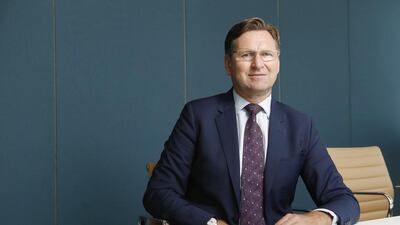Stuart Anderson looks almost a new man. The head of Middle East business for the ratings agency Standard & Poor’s is looking forward to a new era in the region.
I last formally interviewed him three years ago, when S&P – like the other big ratings agencies – was under a cloud of blame for the role it played in the financial crisis. Many accused the raters for over-optimistic assessments of subprime instruments that ultimately blew up in the financial collapse of 2009.
Now that is behind him, and the firm. Earlier this year it paid $1.3 billion as settlement to the American authorities, a big sum for S&P’s size. No further action is expected by regulators, Mr Anderson says.
He is sitting in S&P’s sparkling new offices in the heart of the DIFC Gate district, where he moved last year from premises on the fringe of the financial centre. He hopes S&P can play a central role in the near-term financial strategy of the UAE and of the region, as market conditions enter an apparently benign phase for a debt-orientated business.
The new offices are intended as a mission statement for S&P, which opened up in the region in 2007. “We needed something more substantial in terms of quality to reflect our global standards. And it encourages recruitment. A top quality office enables you to attract good people. We cannot always compete with the investment banks on remuneration so that’s important,” he says.
Former investment bankers with a “more collegiate, less commercially driven approach” are an increasing element of S&P’s recruitment, which looks like it will accelerate in the region. The DIFC office houses 45 staff at present, but has capacity for 75. All the regional businesses of McGraw Hill, the US information group that owns S&P, are under the same roof in DIFC.
But undoubtedly the biggest reason for the new spring in Mr Anderson’s step is the end of the US regulatory investigation. “The shares jumped when the fine was announced. It has removed a big unknown over the whole company. We decided when the US authorities began their investigations to embrace it positively. In 2008, the raters weren’t regulated, now they are. We even have a chief risk officer, just like an investment bank,” he says.
He defends S&P’s record despite the huge fine. “The regulator’s action was confined to our structured finance business, not corporate or sovereign ratings, which are much bigger. And we’ve been warning of the dangers of the Greek situation since 2004, when we saw it as a lead indicator of European troubles, and we’ve been proved right. Only a very small number of investment grade corporates - around 1 per cent - have defaulted since 1980,” Mr Anderson said.
But S&P is plying its trade – basically assessing the creditworthiness of big corporations and governments – at an uncertain time in the region’s financial history. The falling oil price has put pressure on governments, the banks and the big government-related enterprises just as they embark on an infrastructure investment programme prompted at least in part by the heightened demands of Middle East societies in the wake of the Arab Spring turmoil.
“My personal view is that there is further risk of downside pressure on the oil price, which will be lower for a longer period than we originally thought. Undoubtedly this will impact government and bank liquidity,” he says.
“But there is a silver lining, if it becomes the catalyst that helps develop debt markets in the region. It will be a good thing if there are more bond and sukuk issuance in the Middle East, both from the point of view of the borrowers and the foreign investors who might want to get involved in the regional fixed income market.
“I think we’re seeing a desire to turn away from term borrowing from banks, which will have all sorts of knock-on effects for transparency and good corporate governance in the region. It will also give comfort to the equity markets,” he adds.
Saudi Arabia, planning to open its equity markets to foreign investors this summer and in S&P’s view a prime potential market for greater debt issuance, will be a focus of the firm’s expansion, with an office due to open in Riyadh later this year. “The capital markets are very underdeveloped compared to the size of the economy and finance. Only 15 per cent of listed companies have any kind of rating. We have to be there,” he says.
Apart from the Riyadh office, S&P will continue to run its Middle East business from Dubai which, with the Expo 2020 event looming, has its own special funding requirements. “There is obviously a very big funding requirement but we’re not sure yet exactly how Expo will be paid for. I think it’s pretty certain all the major private sector companies will be expect to do their bit and bring some money to the table.”
Some financial experts have forecast that the financial needs of Expo will finally force the government of Dubai to seek a rating for its sovereign debt, but Mr Anderson says he detects no sign as yet that there is an appetite for that by the emirate’s authorities.
“Maybe there are some disclosures they are still uncomfortable, maybe they have a view of their rating not shared by the market, maybe we still need to see how the restructurings from the crisis work through,” he says.
“In any case, we have our internal view of Dubai’s rating.”
fkane@thenational.ae
Follow The National's Business section on Twitter

